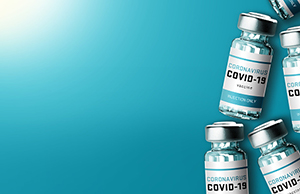In an Israeli case-control study reported in a commentary in The Lancet Oncology, Waissengrin et al found that the short-term safety of the Pfizer BNT162b2 mRNA COVID-19 vaccine was similar in patients with cancer receiving immune checkpoint inhibitors compared with healthy controls.
Study Details
As related by the investigators, the institutional policy of the Oncology Division at the Tel Aviv Sourasky Medical Center (TLVMC) and the Oncology Unit at Bnei-Zion Medical Center, Haifa, was to permit and encourage vaccination for all patients with cancer under active treatment. Only patients with prior COVID-19 infection, as well as those with such acute conditions as active infection or active uncontrolled immune-related adverse reactions, were excluded from the vaccination campaign.

Photo credit: Getty
The current analysis included 134 patients receiving immune checkpoint inhibitor treatment for cancer at the two institutions who received both vaccine doses (first dose between January 11 and February 25, 2021) and 134 healthy age- and sex-matched controls from staff or volunteers at TLVMC who received both doses. Patients receiving immune checkpoint inhibitors were monitored by detailed telephone questionnaires performed 17 to 21 days after the first dose and at a median of 19 days (interquartile range = 12–13 days) after the second dose.
Key Findings
Among patients receiving immune checkpoint inhibitors, the most common adverse effects after the first dose were local, with 21% having pain at the injection site. Systemic adverse effects included fatigue (4%), headache (2%), muscle pain (2%), and chills (1%).
After the second dose of vaccine in patients receiving immune checkpoint inhibitors, four patients (3%) were admitted to hospital: three due to cancer-related complications and one due to fever, with all being discharged after treatment. The most common local adverse effects from vaccination were pain at injection site (63%), local swelling (9%), and local rash (2%), and the most common systemic effects were muscle pain (34%), fatigue (34%), headache (16%), fever (10%), chills (10%), gastrointestinal complications (10%), and flu-like symptoms (2%). No adverse reactions required admission to hospital or any other special intervention.
Overall, systemic adverse reactions occurred in 32% of 116 patients treated with immune checkpoint inhibitors alone and in 44% of 18 who received immune checkpoint inhibitors plus chemotherapy (χ2 test P = .29).
No new immune-related adverse reactions or exacerbation of existing immune-related adverse reactions were observed among patients.
KEY POINTS
- Among patients receiving immune checkpoint inhibitors, the most common adverse effects after the first dose were local.
- After the second dose of vaccine in patients receiving immune checkpoint inhibitors, four patients (3%) were admitted to hospital: three due to cancer-related complications and one due to fever, with all being discharged after treatment.
- Overall, systemic adverse reactions occurred in 32% of 116 patients treated with immune checkpoint inhibitors alone and in 44% of 18 who received immune checkpoint inhibitors plus chemotherapy.
No significant differences in incidence of systemic adverse effects after the second dose were observed between patients and controls for fatigue (P = .76), headache (P = .52), fever (P = .21), gastrointestinal effects (P = .29), chills (P = .70), or flu-like symptoms (P = .32). Muscle pain was significantly more common among patients (P = .024), but no immune-related myositis was diagnosed after vaccination among patients or controls.
A total of 72 patients (54%) had previously experienced grade ≥ 2 immune-related adverse effects from immune checkpoint inhibitor treatment prior to vaccination. No significant difference in the incidence of systemic adverse reactions after the second dose of vaccine was observed between patients with vs without prior immune-related adverse effects (33% vs 34%, P = .94). Among patients with previous immune-related adverse reactions, vaccine-related reactions were mild and did not lead to hospital admission or stopping of cancer treatment.
The investigators concluded, “Our data support the short-term safety of the BNT162b2 mRNA COVID-19 vaccine in patients with cancer being treated with immune checkpoint inhibitors. Because no vaccine-related or immune checkpoint inhibitor–related severe adverse events were observed in this cohort of 134 patients who received two doses of the vaccine, it is unlikely that any common side effects were missed. However, rare side effects might be identified when larger cohorts are investigated. Considering the high mortality of patients with cancer who contract COVID-19, which can be as high as 40% in some patient populations, the benefits of vaccination seem to outweigh the potential harms. Although further studies are needed to determine if these data are also applicable to the other COVID-19 vaccines, our findings might provide some reassurance for their use in patients being treated with immune checkpoint inhibitors.”
Ido Wolf, MD, of the Sackler Faculty of Medicine, Tel Aviv University, is the corresponding author for The Lancet Oncology article.
Disclosure: The study had no funding. For full disclosures of the study authors, visit thelancet.com.

